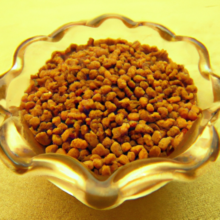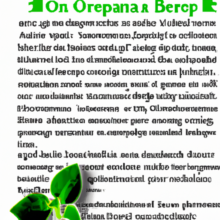The Mood-Lifting Magic Of St. John’s Wort Explained
Discover the fascinating world of St. John’s Wort and its remarkable ability to elevate your mood. This article will delve into the science behind this natural remedy, shedding light on how it works to improve your emotional well-being. Uncover the secrets of this ancient herb that has been used for centuries to combat feelings of sadness and anxiety. Prepare to be amazed by the mood-lifting magic of St. John’s Wort and unlock the key to a happier, more balanced life.

What is St. John’s Wort?
St. John’s Wort, scientifically known as Hypericum perforatum, is a flowering plant that is native to Europe, but can also be found in other parts of the world, including North America and Asia. It derives its name from the fact that it typically blooms around the feast day of St. John the Baptist. This herb has a long history of traditional use in various cultures and is well-known for its medicinal properties.
Botanical Description
St. John’s Wort is a perennial herb that grows up to one meter tall. It has bright yellow flowers with five petals and numerous stamens, giving it a vibrant appearance. The leaves of the plant are opposite and oblong with translucent dots that are visible when held against the sunlight. St. John’s Wort is typically harvested during the summer months when it is in full bloom.
Historical Use
St. John’s Wort has been used for centuries in traditional medicine. It has a rich history of use in treating various ailments, including mental health issues. Ancient Greeks and Romans believed in the healing properties of this herb and used it to alleviate symptoms of melancholy and nervousness. It was commonly employed as a diuretic, expectorant, and wound healer. St. John’s Wort’s legacy has carried on through the ages, and it continues to be used in modern herbal medicine for its numerous health benefits.

Common Names
St. John’s Wort is known by several common names, including Goatweed, Tipton’s Weed, and Klamath weed. These names often reflect the plant’s association with certain regions or its historical usage. Regardless of the name it is called, St. John’s Wort is recognized globally for its potent medicinal properties.
Medical Benefits of St. John’s Wort
Treatment of Depression
One of the most well-known and widely studied benefits of St. John’s Wort is its effectiveness in treating mild to moderate depression. Research has shown that the herb can help alleviate depressive symptoms and improve overall mood. It is believed to work by inhibiting the reuptake of certain neurotransmitters, such as serotonin, dopamine, and norepinephrine, in the brain. By enhancing the availability of these neurotransmitters, St. John’s Wort can help regulate mood and reduce feelings of sadness and hopelessness.
Natural Mood Enhancer
In addition to its potential as a treatment for depression, St. John’s Wort is also known for its mood-enhancing properties. It is believed to increase the levels of serotonin in the brain, which is often referred to as the “feel-good” neurotransmitter. By boosting serotonin levels, St. John’s Wort can promote feelings of happiness, relaxation, and overall well-being. This makes it a popular choice for individuals looking for a natural way to improve their mood and combat stress and anxiety.
Antiviral Properties
St. John’s Wort has been found to possess antiviral properties, particularly against certain strains of the herpes simplex virus. Studies have shown that the herb can inhibit the replication of the virus and reduce the severity and duration of outbreaks. This antiviral activity is attributed to the presence of hypericin and hyperforin, two of the active components found in St. John’s Wort. These compounds have been found to exhibit potent antiviral effects and hold promise in the development of new antiviral therapies.
Pain Relief
For centuries, St. John’s Wort has been used to relieve pain associated with various conditions, such as nerve pain, muscle aches, and menstrual cramps. The herb is believed to have analgesic properties that can help reduce pain and discomfort. It is thought to work by inhibiting certain pain receptors in the brain and reducing inflammation. St. John’s Wort can be particularly beneficial for individuals who prefer natural alternatives to pharmaceutical pain relievers.
Improved Sleep Quality
St. John’s Wort has been found to have sleep-promoting properties and may help improve sleep quality. It is believed to achieve this by modulating the levels of neurotransmitters involved in sleep regulation, such as gamma-aminobutyric acid (GABA). By enhancing GABA activity in the brain, St. John’s Wort can promote relaxation and induce a more restful sleep. This makes it a potential option for individuals struggling with insomnia or sleep disturbances.
Active Components of St. John’s Wort
Hypericin
Hypericin is one of the key active components found in St. John’s Wort. It is a red pigment that gives the plant its characteristic deep reddish color. Hypericin is believed to contribute to the herb’s antidepressant and antiviral properties. It is thought to inhibit the reuptake of neurotransmitters in the brain, resulting in increased levels of serotonin, dopamine, and norepinephrine. This can lead to improved mood and enhanced overall well-being.
Hyperforin
Hyperforin is another important compound present in St. John’s Wort. It is responsible for the herb’s antidepressant and analgesic effects. Hyperforin acts by influencing the release and uptake of various neurotransmitters, including serotonin, dopamine, and GABA. It has been found to have a modulating effect on these neurotransmitters, helping to stabilize mood and alleviate pain.
Flavonoids
St. John’s Wort contains various flavonoids, including hyperoside, quercetin, and rutin. These compounds contribute to the herb’s antioxidant properties, which can help protect the body against oxidative stress and inflammation. Flavonoids also have potential anti-inflammatory effects, further promoting overall health and well-being.
Phloroglucinols
Phloroglucinols are a group of compounds found in St. John’s Wort that have been associated with its antiviral and pain-relieving properties. These compounds have been found to inhibit the replication of certain viruses, including the herpes simplex virus. Phloroglucinols can also block pain receptors in the brain and reduce inflammation, providing relief from various types of pain.

Mechanism of Action
Serotonin Levels
One of the key ways in which St. John’s Wort exerts its effects is by modulating serotonin levels in the brain. Serotonin is a neurotransmitter that plays a crucial role in regulating mood, sleep, appetite, and various other bodily functions. St. John’s Wort is believed to inhibit the reuptake of serotonin, thereby increasing its availability in the brain. This can have a mood-stabilizing effect and help alleviate symptoms of depression and anxiety.
Dopamine Regulation
Dopamine is another important neurotransmitter involved in the regulation of mood, motivation, and reward. St. John’s Wort has been found to influence dopamine levels in the brain, leading to improved mood and a sense of well-being. By modulating dopamine activity, the herb can have a positive impact on motivation, focus, and overall mental performance.
GABA Modulation
Gamma-aminobutyric acid (GABA) is a neurotransmitter that has a calming effect on the brain. St. John’s Wort has been found to enhance GABA activity, promoting relaxation and reducing anxiety. By increasing GABA levels, the herb can help individuals experience a sense of calmness and tranquility.
Neurotransmitter Interactions
St. John’s Wort is believed to interact with multiple neurotransmitters in the brain, creating a complex mechanism of action. By influencing the release, reuptake, and modulation of various neurotransmitters, the herb can have a comprehensive effect on mood, pain perception, and overall brain function. The specific interactions between St. John’s Wort and these neurotransmitters are still being investigated, but the growing body of research suggests promising therapeutic potential.
Effectiveness of St. John’s Wort
Clinical Studies
Numerous clinical studies have been conducted to assess the effectiveness of St. John’s Wort in treating various conditions, particularly depression. The results of these studies have been generally positive, with many showing a significant reduction in depressive symptoms in individuals taking St. John’s Wort compared to a placebo. However, it is important to note that the quality of research varies, and further studies are needed to establish the optimal dosage, treatment duration, and long-term effects of St. John’s Wort.
Comparison with Antidepressants
St. John’s Wort has been compared to conventional antidepressant medications in several studies, with mixed results. Some studies have found that St. John’s Wort can be as effective as certain antidepressants, particularly in cases of mild to moderate depression. However, the herb may not be as effective for severe depression or in individuals who are resistant to traditional antidepressants. It is crucial to consult with a healthcare professional before making any changes to current medication regimens.
Placebo Effect
As with any treatment, the placebo effect can influence the perceived effectiveness of St. John’s Wort. Some studies have suggested that the benefits observed in individuals taking the herb may be partially attributed to the placebo effect. However, placebo-controlled trials have demonstrated that St. John’s Wort consistently outperforms a placebo in improving depressive symptoms, indicating that its therapeutic effects are not solely due to a placebo response.
Individual Response Variability
It is important to recognize that individual responses to St. John’s Wort can vary. While many individuals experience significant improvements in mood and well-being, others may not respond as effectively. Factors such as dosage, treatment duration, and individual biochemistry can influence the outcomes. Regular monitoring and adjustment of treatment plans may be necessary to optimize results.
Dosage and Administration
Recommended Dosage
The appropriate dosage of St. John’s Wort can vary depending on the specific condition being treated. For mild to moderate depression, a typical starting dose is 300 milligrams of a standardized herbal extract, taken three times a day. However, it is essential to consult with a healthcare professional or a qualified herbalist to determine the appropriate dosage for individual circumstances.
Duration of Treatment
The duration of St. John’s Wort treatment can also vary. It is generally recommended to take the herb for at least four to six weeks to assess its effectiveness. In some cases, individuals may continue treatment for several months or longer to maintain the desired effects. Regular monitoring and consultation with a healthcare professional are advised to ensure optimum treatment outcomes.
Interactions and Contraindications
St. John’s Wort can interact with certain medications and may affect their efficacy. It is known to induce the activity of specific liver enzymes responsible for drug metabolism, which can reduce the blood levels of medications, including birth control pills, anticoagulants, and certain antidepressants. St. John’s Wort should not be combined with these medications without appropriate medical supervision. Additionally, individuals with certain medical conditions, such as bipolar disorder or schizophrenia, should exercise caution and consult with a healthcare professional before using St. John’s Wort.
Forms and Preparations
St. John’s Wort is available in various forms, including capsules, tablets, liquid extracts, and teas. Standardized herbal extracts are often preferred as they ensure consistent levels of active compounds. When choosing a St. John’s Wort product, it is important to select a reputable brand that adheres to quality control standards and uses standardized extracts.
Possible Side Effects
Photosensitivity
One of the most well-documented side effects of St. John’s Wort is increased sensitivity to sunlight. It is essential to protect the skin from excessive sun exposure and to use sunscreen when taking the herb to minimize the risk of sunburn or skin damage. If you experience any skin reactions or increased sensitivity to sunlight while using St. John’s Wort, discontinue use and consult with a healthcare professional.
Digestive Issues
Some individuals may experience gastrointestinal disturbances, such as nausea, stomach upset, or diarrhea, when taking St. John’s Wort. These side effects are generally mild and transient, but if they persist or worsen, it is advisable to seek medical assistance. Adjusting the dosage or trying a different preparation may help alleviate these digestive issues.
Allergic Reactions
In rare cases, individuals may develop an allergic reaction to St. John’s Wort. Symptoms of an allergic reaction may include itching, rash, hives, or difficulty breathing. If you experience any of these symptoms, discontinue use and seek immediate medical attention.
Drug Interactions
St. John’s Wort can interact with certain medications, as mentioned earlier. It is crucial to inform healthcare professionals about any herbal supplements or medications being taken to avoid potential drug interactions and adverse effects. It is always recommended to consult with a healthcare professional before starting or stopping any medications or herbal supplements.
Important Safety Considerations
Pregnancy and Breastfeeding
The safety of St. John’s Wort during pregnancy and breastfeeding has not been established conclusively. It is recommended to avoid using St. John’s Wort during pregnancy due to potential effects on the developing fetus. While limited studies suggest that St. John’s Wort may be safe when used cautiously during breastfeeding, it is advisable to consult with a healthcare professional for personalized guidance.
Children and Adolescents
St. John’s Wort should not be used in children and adolescents without appropriate medical supervision. The potential effects of the herb on developing brains and bodies are not well understood, and it is essential to consider the risks and benefits and seek guidance from a healthcare professional.
Mental Health Conditions
Individuals with diagnosed mental health conditions, such as depression or anxiety disorders, should exercise caution when considering St. John’s Wort as a treatment option. While it may be beneficial for some individuals, it is important to consult with a healthcare professional to ensure proper diagnosis, treatment planning, and monitoring.
Liver Health
St. John’s Wort may affect liver function and metabolism of certain drugs. Individuals with liver conditions or those taking medications that adversely affect liver function should exercise caution and seek medical advice before using St. John’s Wort. Regular liver function monitoring may be necessary when using this herb.
Future Research and Potential Applications
Combination Therapies
Research is ongoing to explore the potential synergistic effects of combining St. John’s Wort with other natural compounds or conventional medications. Initial studies have shown promising results in enhancing the efficacy and tolerability of antidepressant medications when used in combination with St. John’s Wort. Further research is needed to establish optimal combinations and dosages for maximum therapeutic benefit.
Neuroprotective Effects
Emerging evidence suggests that St. John’s Wort may have neuroprotective properties, potentially making it a valuable adjunct therapy for neurodegenerative diseases such as Alzheimer’s disease and Parkinson’s disease. Animal studies have shown that St. John’s Wort can protect against oxidative stress and inflammation and may have the potential to slow down the progression of these diseases. However, more research is needed to determine the efficacy and safety of St. John’s Wort in neurodegenerative conditions.
St. John’s Wort for Other Mood Disorders
While depression is the most extensively studied condition in relation to St. John’s Wort, there is growing interest in exploring its efficacy in other mood disorders, such as anxiety, seasonal affective disorder, and postpartum depression. Preliminary research indicates potential benefits, but further investigation is necessary to establish its role in managing these conditions.
Possible Applications in Skin Care
St. John’s Wort’s anti-inflammatory and wound-healing properties make it a potential ingredient in skincare products. It has been traditionally used topically to treat burns, cuts, and skin irritations. Modern research suggests that St. John’s Wort extracts may possess antibacterial properties and can help with wound healing and reducing inflammation. However, more extensive research is needed in this area to validate these findings and explore practical applications.
Conclusion
St. John’s Wort is an herb with a long history of traditional use for its numerous health benefits. From its reputation as a natural mood enhancer to its potential as an antiviral and pain reliever, St. John’s Wort offers a range of therapeutic properties. The active components found in this herb, including hypericin, hyperforin, flavonoids, and phloroglucinols, contribute to its diverse mechanism of action. While evidence suggests the effectiveness of St. John’s Wort in treating depression and other mood disorders, further research is ongoing to deepen our understanding of its optimal use and potential applications. Before incorporating St. John’s Wort into your healthcare regimen, it is important to consult with a healthcare professional to ensure its safe and effective use.




